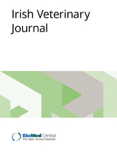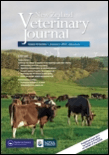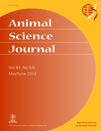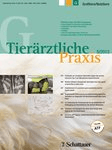
Porcine Health Management
Scope & Guideline
Transforming animal husbandry with cutting-edge insights.
Introduction
Aims and Scopes
- Swine Disease Management:
Research on the epidemiology, diagnosis, treatment, and prevention of diseases affecting pigs, particularly focusing on viral, bacterial, and parasitic infections. - Animal Welfare and Behavior:
Studies evaluating the impact of management practices on the welfare and behavior of pigs, including housing conditions, handling, and environmental enrichment. - Reproductive Health:
Investigations into factors affecting reproductive performance in sows and boars, including hormonal treatments, nutritional influences, and genetic factors. - Biosecurity and Farm Management:
Exploration of biosecurity measures and management practices that mitigate disease risks in pig production, with an emphasis on sustainable practices. - Nutritional Health:
Research on the effects of dietary components on pig health, growth performance, and disease resistance, including studies on feed additives and nutritional supplements. - Veterinary Interventions and Treatments:
Innovative approaches to veterinary care in swine, including pharmacological treatments, vaccination strategies, and alternative therapies.
Trending and Emerging
- Vaccine Development and Efficacy:
An increasing number of studies are focusing on the development and evaluation of vaccines against prevalent swine diseases, including PRRSV and swine influenza, reflecting a critical need for effective disease control measures. - Antimicrobial Resistance:
Research on antimicrobial resistance in swine pathogens is gaining traction, as the industry seeks to address public health concerns and improve on-farm biosecurity measures. - Gut Health and Microbiome Research:
Emerging studies investigate the role of gut health and the microbiome in swine productivity and disease resistance, emphasizing the importance of nutrition and dietary interventions. - Technological Innovations in Swine Management:
There is a notable trend in the application of technology in swine management, including the use of artificial intelligence for monitoring health and reproductive performance. - Sustainable and Ethical Practices:
Research focused on sustainable farming practices and animal welfare is on the rise, reflecting broader societal concerns about the environmental and ethical implications of pig farming.
Declining or Waning
- Traditional Antibiotic Use:
There has been a noticeable decrease in studies focusing on antibiotics for disease prevention, likely due to increased scrutiny and regulations surrounding antibiotic use in livestock. - Invasive Surgical Procedures:
Research on invasive surgical techniques in pigs has waned, potentially as a result of a shift toward more non-invasive and welfare-friendly management practices. - Environmental Impact Studies:
While still relevant, specific studies addressing the environmental impacts of pig farming practices have become less frequent, possibly overshadowed by immediate health and welfare concerns. - Single Pathogen Focus Studies:
The trend of focusing on individual pathogens has declined, with a shift towards more comprehensive studies that consider multi-pathogen interactions and their effects on swine health.
Similar Journals

Revista Colombiana de Ciencias Pecuarias
Championing Scientific Impact in Animal Health and ManagementRevista Colombiana de Ciencias Pecuarias, an esteemed publication in the field of Animal Science and Veterinary Studies, is published by the Universidad de Antioquia, Faculty of Agricultural Sciences. Since its inception in 1996, this Open Access journal has become a vital resource for the dissemination of research and advancements within the agricultural and biological sciences, specifically targeting the veterinary and animal husbandry sectors. Situated in Colombia, its mission is to support and promote scientific knowledge through rigorous review processes and high-quality articles. The journal’s recent classification includes Q4 in Animal Science and Zoology and Q3 in Veterinary categories, illustrating its commitment to enhancing its scientific impact. As it converges from 2008 to 2024, this journal aims to engage researchers, professionals, and students alike, establishing a collaborative environment for innovative research and findings that shape the future of animal sciences globally.

IRISH VETERINARY JOURNAL
Empowering animal health through innovative research.IRISH VETERINARY JOURNAL is a premier open-access publication in the field of veterinary science, established to disseminate high-quality research and innovations that advance the veterinary profession and animal health. Published by BMC since 2004, this journal not only ensures worldwide access to cutting-edge findings but also maintains an impressive ranking as Q1 in the Veterinary (miscellaneous) category according to the 2023 metrics, highlighting its significance and influence. With an impressive Scopus rank of #19/194 and a 90th percentile placement, it provides a robust platform for researchers, professionals, and students alike to engage with the latest studies, reviews, and case reports. The journal's coverage spans from its inception in 1973 to the present, catering to a diverse audience interested in various aspects of veterinary science, ensuring that it remains an essential resource for those passionate about the welfare of animals and the advancement of veterinary practices.

NEW ZEALAND VETERINARY JOURNAL
Elevating veterinary science with impactful insights.NEW ZEALAND VETERINARY JOURNAL, published by Taylor & Francis Ltd, stands as a pivotal platform in the realm of veterinary science, contributing significantly to the global discourse on animal health and welfare since its inception in 1952. With an ISSN of 0048-0169 and an E-ISSN of 1176-0710, this journal offers invaluable insights within both the veterinary and general medical fields, currently achieving a commendable Q2 ranking in Veterinary (miscellaneous) and Q3 in Medicine (miscellaneous) for 2023. Its Scopus ranking places it in the 76th percentile among veterinary journals, affirming its high-impact presence in academia. While access to this journal is not open, it maintains an essential role for researchers, professionals, and students aiming to advance their knowledge and contribute to the field of veterinary science. With a commitment to disseminating quality research, NEW ZEALAND VETERINARY JOURNAL enriches the understanding of veterinary practices and enhances ongoing dialogue on critical health issues affecting animals, promoting better outcomes through scientific inquiry.

PESQUISA VETERINARIA BRASILEIRA
Fostering global dialogue in veterinary practices.PESQUISA VETERINARIA BRASILEIRA is a premier scholarly journal that serves as a vital platform for disseminating high-quality research in the field of veterinary sciences. Published by REVISTA PESQUISA VETERINARIA BRASILEIRA, this Open Access journal has been a beacon of knowledge since 1997, allowing global access to its valuable content and fostering collaboration among researchers, professionals, and students. With an ISSN of 0100-736X and an E-ISSN of 1678-5150, it stands out for its commitment to enhancing the understanding of veterinary practices, animal health, and public health implications in the context of Brazil and beyond. As of 2023, it holds a Q3 category in veterinary miscellaneous and ranks at the 43rd percentile according to Scopus, reflecting its growing influence and contribution to the veterinary community. Based in Seropédica, Rio de Janeiro, this journal publishes research covering a wide range of topics, aiming to facilitate knowledge exchange and drive innovation within the field. Join the conversation and contribute to the advancement of veterinary science through your submissions and readership.

Translational Animal Science
Bridging Science and Practice for Animal WelfareTranslational Animal Science, published by Oxford University Press Inc, stands as a prominent journal in the fields of Animal Science and Zoology as well as Veterinary Sciences, achieving a commendable Q2 ranking in both categories for 2023. With an E-ISSN of 2573-2102 and transitioning to an Open Access model since 2017, this journal fosters accessibility and dissemination of vital research that bridges the gap between basic animal science and its practical applications. The journal's significant impact factor, where it ranks in the 71st and 65th percentiles respectively for Veterinary and Agricultural and Biological Sciences disciplines, highlights its importance as a resource for emerging trends and innovations in animal research. With submissions accepted until 2024, Translational Animal Science not only contributes to advancing knowledge but also aims to engage a broad audience of researchers, professionals, and students dedicated to improving animal health and welfare. Based in India, the journal serves as an essential platform for the exchange of scientific ideas that facilitate progress within these vital fields.

BMC Veterinary Research
Leading the way in impactful veterinary discoveries.BMC Veterinary Research, published by BMC in the United Kingdom, stands as a pivotal open-access platform dedicated to advancing the field of veterinary science since its inception in 2005. With an impressive impact factor that reflects its influential presence, this journal has achieved a remarkable ranking of #17 out of 194 in the Scopus Veterinary category, placing it in the 91st percentile among its peers. The journal serves as an essential resource for researchers, professionals, and students alike, fostering the dissemination of high-quality research and innovative practices within the veterinary and broader medical communities. With its commitment to open access, BMC Veterinary Research ensures that valuable insights are accessible to all, promoting collaboration and knowledge sharing that drive the advancement of veterinary sciences. As it continues to publish significant findings until 2024, it remains a key contributor to the contemporary discourse on animal health and welfare.

Abanico Veterinario
Exploring Innovations in Animal Health and WelfareAbanico Veterinario is a prominent academic journal dedicated to the field of veterinary science, published by Sergio Martinez Gonzalez. With its ISSN 2007-4204 and E-ISSN 2448-6132, this journal serves as a vital resource for researchers, practitioners, and students interested in the latest advancements and research in veterinary medicine. Although Abanico Veterinario operates on a non-open access model, it provides insightful content that addresses a diverse range of topics such as animal health, veterinary ethics, and innovative practices. The journal aims to promote knowledge sharing and foster collaboration within the veterinary community, ultimately contributing to improved animal care and welfare. With a commitment to excellence and a growing reputation within the field, Abanico Veterinario stands as an essential platform for those seeking to enhance their professional skills and stay abreast of emerging trends in veterinary science.

Large Animal Review
Connecting researchers and practitioners for better outcomes.Large Animal Review is a prestigious academic journal dedicated to advancing the field of veterinary science, particularly focusing on the health and management of large animals. Published by the SIVAR-SOC ITALIANA VETERINARI ANIMALI REDDITO, this journal is an invaluable resource for researchers, practitioners, and students eager to explore innovative methodologies, research findings, and case studies related to veterinary medicine for larger species. With a commitment to quality, Large Animal Review holds a Q3 categorization in the Veterinary (miscellaneous) sector according to the 2023 metrics, indicative of its growing influence within the academic community. The journal benefits from an international readership and is dedicated to fostering interdisciplinary collaborations, making it an essential addition to any professional's library. The journal is accessible through various platforms, ensuring wide distribution of its valuable content, as it strives to enhance the understanding and welfare of large animals across diverse settings.

ANIMAL SCIENCE JOURNAL
Advancing the Frontiers of Animal ScienceAnimal Science Journal, published by Wiley, stands as a premier platform for advancing knowledge in the fields of Agricultural and Biological Sciences, Animal Science and Zoology, and Food Science. With an ISSN of 1344-3941 and an E-ISSN of 1740-0929, this journal not only enjoys a commendable Q2 ranking across multiple categories, reflecting its significance and impact within the academic community, but it also ranks within the top percentiles in terms of Scopus rankings. Operating out of the United Kingdom, the journal covers a broad spectrum of research topics relevant to animal science, encompassing both theoretical insights and practical applications. While it is not an open access journal, it remains an essential resource for researchers and practitioners eager to enhance their understanding of animal sciences, contribute to ongoing debates, and stay abreast of the latest findings from 2003 through 2024. Scholar engagement and innovative research are central to the journal’s objectives, making it an invaluable asset for students, professionals, and academics alike.

TIERAERZTLICHE PRAXIS AUSGABE GROSSTIERE NUTZTIERE
Innovating veterinary practices for better animal welfare.TIERAERZTLICHE PRAXIS AUSGABE GROSSTIERE NUTZTIERE is a pivotal journal in the field of veterinary science, focusing specifically on large animals and food production animals. Published by GEORG THIEME VERLAG KG, this journal has been a resource for veterinary professionals since its inception in 1996, delivering current research and practical insights to its readership through 2024. Despite its classification in the Q4 quartile for both Food Animals and Veterinary (miscellaneous) categories, the journal provides an essential platform for emerging studies, contributing to the interdisciplinary dialogue around veterinary practices. Researchers and practitioners benefit from the journal’s commitment to advancing knowledge, despite its modest rankings in Scopus where it stands at rank #150 in General Veterinary and #32 in Food Animals. While not currently offering Open Access options, the journals’ significant body of work remains an invaluable asset for those dedicated to enhancing animal health and welfare. TIERAERZTLICHE PRAXIS serves as a cornerstone for academic exploration and practical application in the veterinary field, fostering a deeper understanding of the complexities involved in animal care and management.